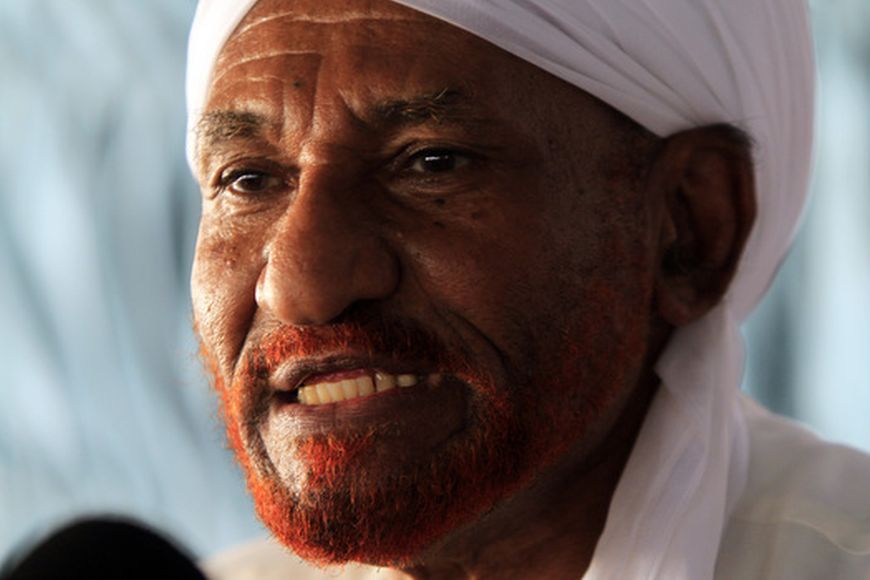Cairo-During an interview with Asharq Al-Awsat newspaper, leader of Sudan’s largest opposition party, National Umma Party, Al-Sadiq al-Mahdi stressed that a popular uprising in Sudan that will lead to a coup d’etat in the country is closer than many expect.
He said the recommendations emanating from the national dialogue held in the country were compatible with many of the national agenda’s articles. Should the government accept these recommendations, people’s demands can be fulfilled through dialogue.
Mahdi believes that change in Sudan necessitates a planned uprising, and not a chaotic one, in order to avoid bloodshed and chaos. He also deprecated the warnings of state collapse in case an uprising kicked off, stressing that the continuance of the regime is the shorter path toward the state’s collapse.
Below is a selected set of questions answered by Mahdi:
*You recently met Thabo Mbeki in Kodissa, what can you say about it?
The best thing that can happen to achieve a Sudanese national dialogue similar to the “Kodissa” approach is to hold a bilateral dialogue based on an agenda that tackles important articles on ending the war between the two parties, guaranteeing public freedoms and equality among citizens, and building democratic societies based on the rule of law.
*Some considered that your visit to Johannesburg is a first step toward signing the roadmap?
My political approach is based on credibility, and I said that the situation has gone beyond signing the map. I said that the map included some positive points, but it also included specific shortcomings that should be treated. I previously said, and I reiterate that refusing to sign the map doesn’t mean that we oppose to its goals, which aim to hold a dialogue that gathers all the parties of the Sudanese conflict under the resolution of the Peace and Security Council (PSC) no.539.
*In your latest statements, you said that the recommendations of the interior dialogue respond to most of the opposition’s demands. Does this means that you are getting closer to the Wathba dialogue again?
The Secretary General of the dialogue sent us a version of the recommendations of this dialogue. We didn’t review the version and we repeatedly said that we are not concerned with the 10th of October’s dialogue, yet we are concerned with its results. The legitimate
national demand is the establishment of peace and a complete democratic transformation; and this is our national agenda.
*The regime is facing an ascending popular rejection in line with the terrible deterioration in the prices of services and commodities and the growing economic crisis. Why would you serve the regime by agreeing on the dialogue?
We have repeatedly highlighted the bad situation this country is witnessing because of this regime, starting with the distortion of Islam, to the deterioration in economic and security , and the humiliating blunder in the foreign relations. Therefore, we think that the uprising will take place, and we are working on expanding the mobilization for it.
*In case a popular uprising kicked off in the country, do you think that chaos will dominate Sudan, or is the opposition ready to contain it?
As all uprisings throughout history, particularly in Sudan, a successful uprising will paralyze the government and overthrow it. Armed forces will be able to contain the situation, if they side with the people, as in October 1964 and April 1985.
* When would you return to Sudan?
I have completed my missions abroad , and we are discussing my return to add it to the national agenda.
